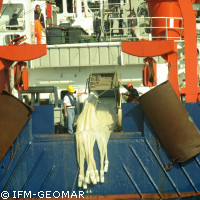Invasive jellyfish increase pressure on cod stock in Baltic Sea
A team of German and Danish researchers has found evidence that the warty comb jellyfish (Mnemiopsis leidyi) may be increasing the threat to cod stocks in the Baltic Sea. The jellyfish, which is indigenous to the North American East coast, is likely to have been introduced into the Baltic Sea by shipping traffic and feeds on zooplankton (as do the fish) as well as fish larvae and eggs. The findings are reported in the journal 'Marine ecology progress series'. The discovery, which needs to be backed up by further research, the scientists say, was made during an expedition supported by the EU through the European Network of Excellence for Ocean Ecosystems Analysis (EUR-OCEANS) and the German Ministry of Education and Research (BMBF) as part of the GLOBEC Germany project. The area where the jellyfish were found, the Bornholm Basin, is the most important breeding ground for cod in the Baltic Sea. 'As soon as we saw the eggs inside the warty comb jelly, we knew which effects this organism could have on the entire planktonic ecosystem of the Baltic Sea,' says Holger Haslob of the Leibniz Institute for Marine Sciences (IFM-GEOMAR) in Kiel, Germany, the lead author of the joint study by the IFM-GEOMAR and the Danish Institute for Fisheries Research. The find confirms the researchers' suspicion that the invasive species will threaten the survival of the cod in its early life stages, adding to the pressure from overfishing and environmental pollution that the cod stock has been suffering from for years. In addition, the jellyfish's feeding behaviour might have a lasting effect on the entire ecosystem, as cod is one of the species at the top of the food chain in the Baltic Sea. Mnemiopsis leidyi has spread further and further since it was first discovered in the Black Sea in the 1980s. From there, it advanced into the Azov Sea, the Marama Sea, the Mediterranean and the Caspian Sea, always accompanied by a drastic decline in fish stocks. The EUR-OCEANS network brings together 66 organisations from 25 countries with the overall objective of developing models for the assessment and forecasting of the impacts of climate change and other man-made factors on the pelagic ecosystems in the open ocean. €10 million out of a total project cost of €40 million is covered by the Sixth Framework Programme (FP6). The GLOBEC Germany project, on the other hand, is investigating the trophodynamic interactions between zooplankton and planktivorous fish in relation to reproductive success under the impact of physical forcing.
Countries
Germany, Denmark



